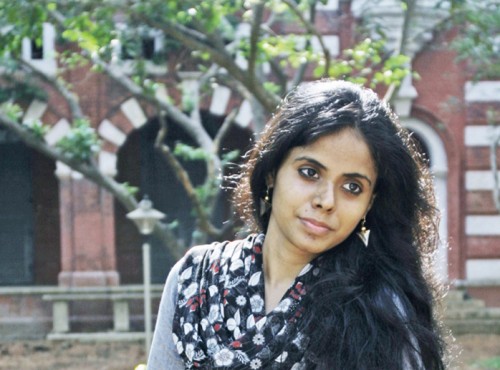Retelling the Ramayana: Poems from Meena Kandasamy
by Meena Kandasamy / February 2, 2012 / 2 Comments
Meena Kandasamy’s poetry reinforces her self-description as an “angry young woman.” When asked to share unpublished work Kandasamy instead sent Sampsonia Way three poems from Ms. Militancy, her second poetry collection, asking that, in light of the free speech debate raging in India, we publish poetry that has been received there with hostility. She explained that “In the present context, where freedom of expression is at peril in India, it is important to publish something radical.”
Last month Salman Rushdie cancelled an appearance at the Jaipur literature festival due to death threats. Sanjay Kak’s documentary Jashn-e-Azadi: How We Celebrate Freedom was to be screened in February at Symbiosis College; however the founder of the college cancelled the screening, saying the film was controversial. On February 1st writer Taslima Nasreen was asked to cancel her book release at the Kolkata Book Fair because of fundamentalist pressure.
In Ms. Militancy Kandasamy retells Hindu and Tamil mythology through a feminist perspective. Below she provides a background for the two mythical women she has written about: Sita and Shoorpanaka. These poems were originally published by Navayana Publications in 2010 and are reproduced with permission of the author.
Rightwing narratives of the Ramayana portray Sita as the ideal, obedient wife whom all women must seek to emulate. Reading between the lines of the Ramayana one realizes that she is in fact the first woman to literally “Step across the line.” She not only crosses the Lakshman Rekha (a Line of Control that she was asked not to leave), but she also chats up a stranger, the King Ravan in disguise. When her husband and his brother return, she is no longer home. In the epic, it is said that she was abducted. In my first two poems I try and imagine a scenario where she might have walked out of her own free will.
In the third poem, “Traitress,” I look at the Ramayana from the perspective of another victimized woman, Shoorpanaka. She is Ravan’s sister, and she has her ears, nose, and breasts cut off when she proposes to Ram and his brother Laxman, whom she meets in the forest. In the traditional narrative, Ram’s fidelity to his wife paints him as a superhero in spite of (or perhaps, because of) the sexual violence that he inflicts on a woman who expresses her desire. The narrative in Valmiki’s Ramayana declares it to be unfeminine and immoral for a woman to speak her mind (and her body) and for that sin, she has to meet the fate of being dismembered and disfigured. Shoorpanaka’s ugliness makes her the antithesis of Sita and reinforces Aryan/Brahminic notions of beauty.
Sita and Shoorpanaka were soul-sisters from the beginning. They are women who spoke their minds, women who let their bodies speak. In doing so, they danced with danger.
Read Meena’s interview with Sampsonia Way here.






2 Comments on "Retelling the Ramayana: Poems from Meena Kandasamy"
Reading between the lines doesn’t mean you can interpret your own meaning. Hermits are never considered as strangers in those times. The author tries to imply the meaning that Mother Sita was happy to get abducted, which is ridiculous. Mother Sita and Lord Rama had great love for one another, and saying that She walked out of Her will is utterly rubbish. On the contrary, Mother Sita had fought with Lord Rama to follow Him to the forest. That incident beautifully illustrates the freedom women had to express their rights and desires. Wasn’t Kaikeyi receiving the boons from Dasaratha her freedom and rights?
In fact, even Lakshman Rekha doesn’t appear in Valmiki Ramayanam. Nowadays, it’s become vogue, especially for this so-called forward and intellectual thinkers to falsely interpret the wonderful incidents in our epics and weave their own meaning to seek false glory and attention.
Unlike what the author portrays here even Supranakha was not hurt for speaking her mind. At first, both Ram and Lakshmana politely decline her request. But she tried to force herself on them, and she got hurt only because she intended to harm Mother Sita. Supranakha’s malicious thinking that by getting rid of Sita she could achieve her goals only got her the punishment. This is very clearly explained in Valmiki Ramayan. Also, Lord Rama during the next incarnation as Shri Krishna had fulfilled Surphanka’s desire by making her one of his wives.
So instead of retelling Ramayana with all false understanding, I ask the author to first get her perspectives right, which is the first trait for any intelligent and sensible human(writer and gender come next!).
The universal truth is that he/she is right in his/her own perspective. Just because Valmiki had rendered the first version of it, Ramayana doesn’t have to have the TRUTH (again varies according to an individual’s belief). If by doing so or considering that the myth really rings with the so-called “TRUTH”, unquestionably every myth ever foretold in world history will have to be honestly TRUE! which in a way makes every myth in every religion/nation look ludicrously fictitious mythos. I am really surprised at how people tend to react so self-righteously and display a smugly disdainful attitude towards something that’s inclined to have a newer perspective, if not at-least something that gives way to a broader outlook. Aren’t people yet tired of blindly reveling on convictions presupposed by who knows who.
Interestingly a bold attempt by Meena Kandasamy. Bravado. Lately I had come across a similar frame of reference ventured by Spivak’s translation of Mahasweta Devi’s “Breast stories”, where the protagonist Dopdi Mejhen, a tribal revolutionary subaltern women backlashes against the guerilla troops who gang rapes her (‘kounter me–?), unlike Draupadi of Mahabharata who is saved by Lord Krishna, who breezes in, punches the clock and saves the day!